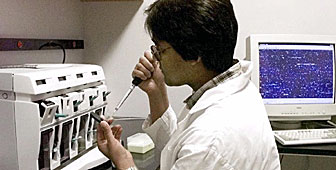Politicians seek to block gene patent

A leading political party is trying to prevent a US firm from patenting a breast cancer gene, saying it would give the company a monopoly on research.
The Social Democrats – one of the parties in government – has appealed against the patent application filed at the European Patent Office in Munich, Germany.
They want to stop the United States firm, Myriad Genetics, from being awarded worldwide rights to a gene linked to breast cancer. The Netherlands government and the Marie Curie Cancer Foundation are also seeking to block the patent.
“We oppose the patent for a number of reasons,” said Swiss biologist, Florianne Koechlin, who is supporting the party’s action.
Monopoly rights
“We’re against the worldwide monopoly rights that the patent [would give] the US firm. We think genes are the common heritage of mankind and that everyone should have access to them.
“It goes against patients’ well-being as the cost of genetic tests for breast cancer have already gone up in price.”
The company applied for the patent for gene BRCA 1 ( patent number EP 0 705 902) last November. Under European rules, opponents have nine months to file objections to the request. The deadline for all complaints is August 28.
Koechlin says a patent would make it expensive and difficult for other companies to carry out further research into the genetic causes of breast cancer.
“Myriad Genetics has set a precedent by actively and aggressively insisting that the patent guarantees monopoly,” Koechlin told swissinfo.
“They have already blocked other American labs from doing the same tests [as they have carried out],” she explains. “Other labs wishing to carry out tests have to send their samples to Myriad Genetics in Salt Lake City.”
Dangerous precedent
Christoph Rehman-Suter, president of the Swiss National Advisory Commission on Bio-medical Ethics, told swissinfo that Myriad had set a dangerous precedent, which could govern the way hundreds of thousands of women are diagnosed and treated for breast cancer.
“If the patent system is an instrument for big companies to get control over whole areas of the human genome it’s really a matter with an enormous social impact,” he said.
Opponents of patenting say genes are not inventions, but discoveries, and that no one can therefore claim ownership of them.
Companies active in gene research counter that, by modifying a gene, they have created something that did not exist before, and that a patent is therefore justified.
“You can’t invent genes which already exist, you can only discover them,” says Suzanne Braga, co-president of the Swiss Society for Genetic medicine.
She adds that the BRCA1 patent raises the thorny ethical issue of a single company owning the rights to a certain part of human life. She says this flies in the face of simple human dignity.
Koechlin goes further saying that patenting genes is “reductionist and mechanistic”. “They’re treating genes as if they’re inert chips which can be transferred from one animal to another and nature just doesn’t work like that,” she states.
by Sally Mules and Urs Geiser

In compliance with the JTI standards
More: SWI swissinfo.ch certified by the Journalism Trust Initiative

You can find an overview of ongoing debates with our journalists here . Please join us!
If you want to start a conversation about a topic raised in this article or want to report factual errors, email us at english@swissinfo.ch.